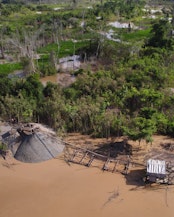Advancing knowledge on artisanal gold mining

Advancing knowledge on artisanal gold mining
- Our Objective
This project aims to generate and share knowledge on artisanal gold mining to support the transition toward a more responsible model in the Amazon forest. By focusing on scientific evidence, stakeholder engagement, and capacity-building, it contributes to the development of fairer, cleaner, and more sustainable gold supply chains.
- Figures
The project was launched on March 1, 2023 and is currently in progress.
Summary
In Madre de Dios, we support the development of a more responsible gold supply chain by collecting large-scale data on artisanal and small-scale miners who are formalized or in the process of formalizing. Using experimental surveys, we explore miners’ preferences around formalization policies and cleaner technologies, while developing scientific methods to trace mercury-free gold.
The project also promotes positive narratives around responsible mining, engages with Swiss stakeholders, and supports miners through training and knowledge exchange. It is led by an interdisciplinary global team—including biologists, climate scientists, and economists—in collaboration with the SAM Hub and the Political Economy, Land Systems, and Environmental Governance teams.
Project Connections
- Part of the solutionscape
Maintaining multifunctional landscapes in a tropical forest frontier
Timeline
Governance study in Peru shows: Protected areas most effective at conservation
Project Update April 29, 2024
What kind of nature conservation has real impact? And how can we best organise our interventions accordingly? To answer these questions, Dr Pablo Negret from the Wyss Academy's Land Systems and Sustainability Transformations research team, in collaboration with the Wyss Academy’s Hub South America, investigated the impact of different forms of governance on forest loss in the Peruvian Amazon - as well as the associated CO2 emissions. The governance systems analysed include nature reserves, Indigenous territories and concessions for non-timber forest products. The study covers the period between 2000 and 2021 and also analyses logging and mining concessions for comparison. The method: As part of a counterfactual analysis, scenarios without the governance systems described were simulated in order to understand their impact on forest loss and CO2 emissions. The study shows that protected areas are most effective in preventing forest loss, but also provides robust evidence for the long-term positive impact of possible alternative conservation measures - i.e. Indigenous territories or non-timber forest product concessions. These findings are essential for achieving various goals of the Kunming-Montreal Global Biodiversity Framework and the United Nations Framework Convention on Climate Change.
Advancing Responsible Gold Mining: Narratives and Innovations in Peru
Project Update April 25, 2024
In 2023, working together with the Hub South America, the Political Economy and Sustainable Development team made significant strides in promoting responsible gold mining in Madre de Dios, Peru. Through stakeholder workshops held in Peru and Switzerland, they brought together miners, indigenous people, and experts, to foster future collaborations. They have also discovered misconceptions about mining and how it has influenced past decisions made by the private sector, NGOs, and governments. Based on these findings, the research team designed the project called "Narrative Intervention: The Case of Production Technology for Gold Mining in Peru," which aims to explore the influence of narratives on the adoption of clean technologies for mining among artisanal miners in the Peruvian Amazon, specifically in the Madre de Dios region. This study is based on the working paper "Analyzing Climate Change Policy Narratives with the Character-Role Narrative Framework," written by Prof. Dr. Kai Gehring and the PhD Researcher Matteo Grigoletto. To address this issue, the team will use a lab-in-the-field experiment to combine the precision of laboratory experiments with the realism of field experiments. They will promote an aspirational narrative embedded in videos to overcome psychological barriers and facilitate behavioral change. This study is conducted by the PhD Researcher Matteo Grigoletto and Dr. Fernando Fernandez, with the local support of Alejandro Portillo, a research associate at the Hub South America.
Other Projects in this Solutionscape
From knowledge to action: Information for conservation in Tambopata
From knowledge to action: Information for conservation in TambopataTambopataLab: Incubating solutions for conservation
TambopataLab: Incubating solutions for conservation







